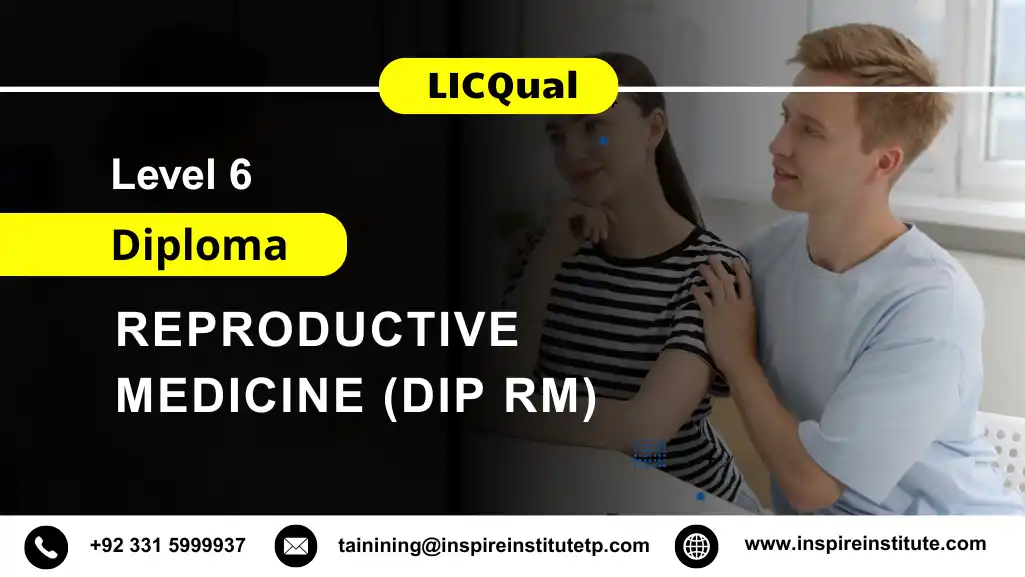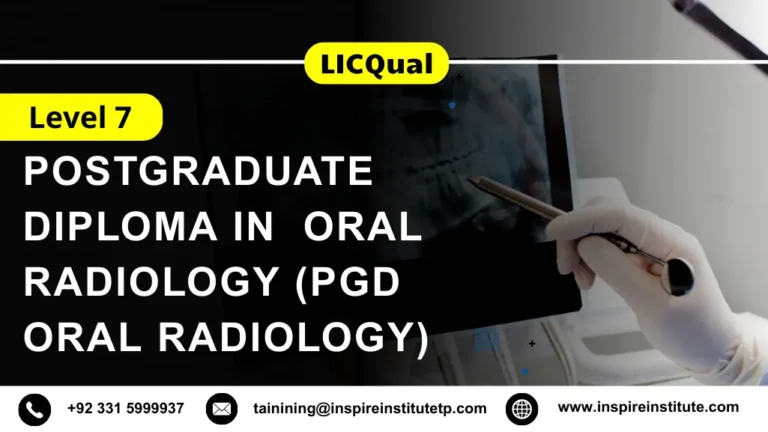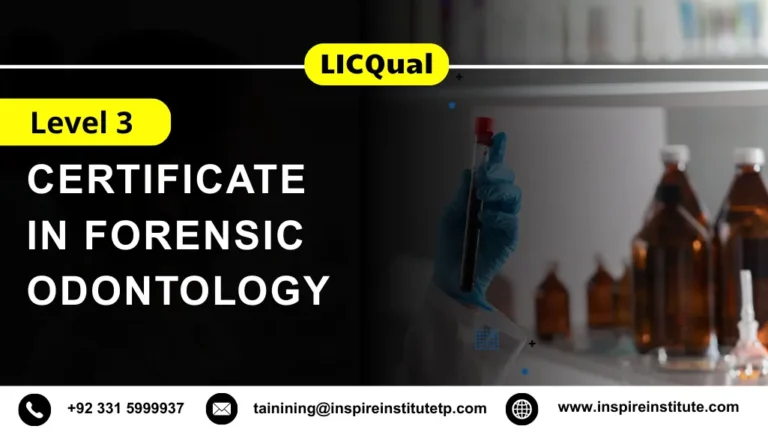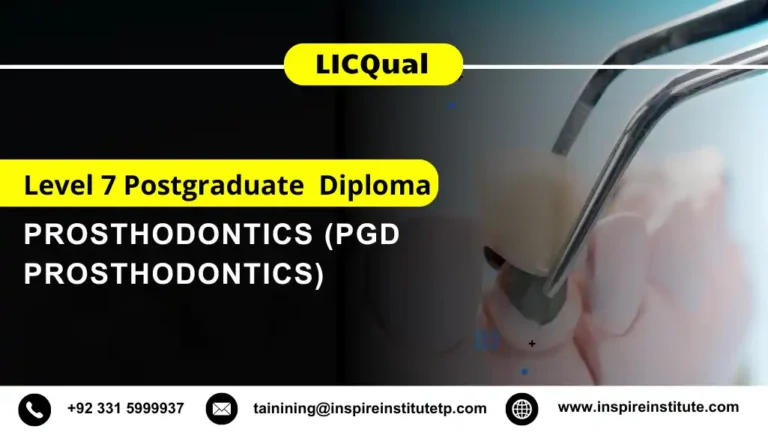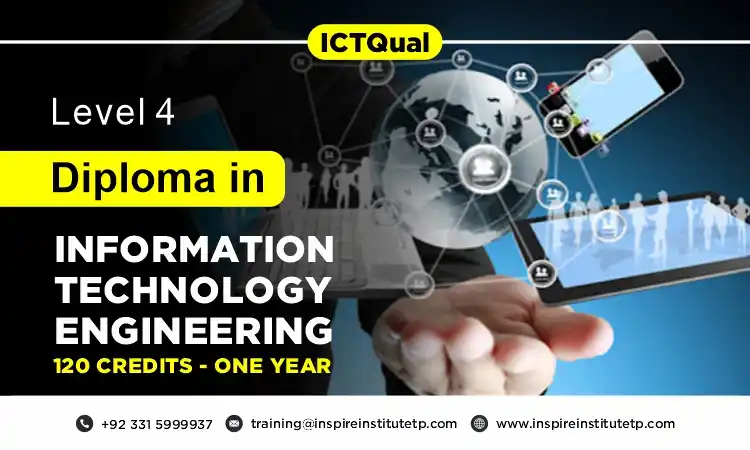LICQual Level 6 Diploma in Reproductive Medicine (Dip RM)
The LICQual Level 6 Diploma in Reproductive Medicine (Dip RM) is a globally recognized UK-based qualification designed for medical professionals, healthcare practitioners, and aspiring fertility experts seeking to specialize in reproductive health and medicine. In today’s world, where fertility challenges and reproductive disorders are increasingly prevalent, the demand for skilled specialists in reproductive medicine and fertility treatment is higher than ever. This advanced diploma bridges theoretical learning with practical expertise, equipping learners with the critical knowledge required to understand, diagnose, and manage reproductive health conditions effectively.
The LICQual Level 6 Diploma in Reproductive Medicine focuses on the scientific, clinical, and ethical dimensions of human reproduction. Learners explore key concepts such as reproductive endocrinology, fertility assessment, assisted reproductive technologies (ART), and reproductive genetics. This comprehensive approach ensures that professionals can apply advanced clinical reasoning and problem-solving skills in diverse reproductive healthcare environments. The course also strengthens participants’ understanding of the psychosocial aspects of fertility, helping them deliver compassionate and holistic patient care.
The LICQual Level 6 Diploma in Reproductive Medicine (Dip RM) is ideal for doctors, gynecologists, nurses, laboratory technologists, and healthcare educators who wish to expand their professional capabilities in fertility and reproductive science. Learners will develop a strong foundation in reproductive physiology, reproductive system pathologies, and clinical treatment protocols that align with global healthcare standards. This diploma enhances both clinical competence and employability in the competitive field of reproductive health.
The LICQual Level 6 Diploma in Reproductive Medicine (Dip RM), learners will be equipped to pursue advanced roles in reproductive healthcare, fertility research, and clinical consultancy. This qualification not only enhances professional credibility but also opens doors to global career opportunities in reproductive medicine, fertility clinics, and medical research institutions. With its comprehensive learning structure and practical relevance, this course serves as a pathway to mastering the science of human reproduction and advancing healthcare excellence in fertility and reproductive wellness.
Why Choose this Qualification
The LICQual Level 6 Diploma in Reproductive Medicine (Dip RM) is a globally respected UK-based program tailored for professionals seeking advanced knowledge and expertise in the field of reproductive health, fertility, and human biology. This qualification bridges scientific understanding and practical application, empowering learners to diagnose, manage, and treat complex reproductive health challenges. It provides an excellent opportunity to enhance professional credibility, deepen clinical skills, and pursue rewarding careers in healthcare, fertility treatment, and reproductive research.
Key Reasons to Choose This Qualification
Globally Recognized and Accredited Qualification
- Awarded by LICQual, a reputable UK awarding body recognized for academic and professional excellence.
- Globally acknowledged, enhancing international employability and career mobility.
- Meets international standards for reproductive medicine education and professional development.
- Enables learners to qualify for advanced positions in healthcare, research, and clinical management.
- Provides a strong foundation for pursuing postgraduate or doctoral-level studies.
Comprehensive Knowledge of Reproductive Medicine
- Covers all aspects of human reproductive physiology, endocrinology, and embryology.
- Focuses on infertility management, assisted reproductive technologies (ART), and hormonal therapies.
- Teaches diagnostic and treatment strategies for reproductive system disorders.
- Includes current scientific research and clinical practices from global reproductive health standards.
- Equips learners with a thorough understanding of both male and female reproductive health.
Practical and Clinical Skill Development
- Enhances practical competencies through case studies, laboratory work, and simulated clinical exercises.
- Develops diagnostic and problem-solving abilities for managing infertility and reproductive issues.
- Trains learners to handle reproductive health equipment and laboratory procedures.
- Strengthens technical proficiency in sample analysis, hormonal assessment, and reproductive testing.
- Prepares graduates for immediate application of skills in fertility clinics and medical laboratories.
Career Advancement and Professional Recognition
- Increases employability in hospitals, fertility centers, and reproductive health organizations.
- Recognized as a valuable qualification for doctors, gynecologists, nurses, and medical technologists.
- Opens pathways for leadership roles in fertility management, reproductive consultancy, and education.
- Enhances professional credibility and builds trust with patients and employers.
- Supports continuous career progression in both clinical and academic fields.
Ethical, Legal, and Psychological Awareness
- Provides in-depth understanding of the ethical and legal dimensions of reproductive healthcare.
- Teaches professional responsibility in handling sensitive reproductive issues.
- Promotes patient-centered care through ethical and compassionate practice.
- Develops counseling and communication skills to support patients emotionally.
- Encourages respect for confidentiality, diversity, and cultural sensitivity in clinical settings.
Research and Innovation in Reproductive Science
- Encourages evidence-based learning and critical thinking in reproductive biology.
- Develops skills for conducting scientific research, data interpretation, and fertility studies.
- Equips learners to contribute to innovations in fertility treatments and reproductive technologies.
- Provides exposure to the latest developments in genetics, IVF, and embryology.
- Builds the analytical ability to evaluate and apply emerging medical evidence.
Flexibility and Assignment-Based Learning
- Delivered through an assignment-based structure, making it accessible to working professionals.
- Offers flexible study modes that allow learners to balance work, education, and personal commitments.
- Encourages self-paced learning while maintaining academic rigor and quality standards.
- Promotes independent research and practical understanding through structured assessments.
- Provides continuous academic support and guidance throughout the learning journey.
Contribution to Global Reproductive Health Improvement
- Empowers learners to improve reproductive health standards in their communities.
- Equips professionals with the knowledge to address fertility challenges worldwide.
- Supports sustainable healthcare goals by promoting reproductive wellness and education.
- Encourages collaboration with international reproductive health initiatives and organizations.
- Enhances the global impact of learners as experts in reproductive medicine and fertility management.
The LICQual Level 6 Diploma in Reproductive Medicine (Dip RM) stands out as a transformative qualification that blends theoretical insight with clinical excellence. It is an ideal choice for professionals committed to advancing their expertise, improving patient outcomes, and contributing to the global development of reproductive healthcare. With its international recognition, practical training, and flexible learning model, this diploma serves as a gateway to professional growth and lifelong success in the dynamic field of reproductive medicine.
Course Overview
LICQual UK Awarding Body
Average Completion Time:
6-24 Months
Study Units: 6 Units
Evidence & Assignment Based
Mandatory Units
Who Should Take This Course
The LICQual Level 6 Diploma in Reproductive Medicine (Dip RM) is a prestigious UK-based qualification designed for professionals and aspiring specialists in reproductive health, fertility sciences, and clinical medicine. This assignment-based program provides advanced theoretical knowledge and practical competencies necessary to understand and manage reproductive health issues with evidence-based precision. It equips learners with specialized skills to work in healthcare, research, and education sectors focusing on human reproduction, fertility treatments, and reproductive technologies.
This course is suitable for
Medical Practitioners and Doctors
- Gain an in-depth understanding of reproductive endocrinology, infertility management, and assisted reproductive technologies.
- Learn to diagnose and manage reproductive health conditions with evidence-based clinical practices.
- Develop expertise in fertility treatments, hormonal therapy, and reproductive system pathophysiology.
- Enhance professional credentials for roles in fertility clinics, hospitals, and reproductive research centers.
- Stay updated with current global standards and ethical frameworks in reproductive healthcare.
This course is suitable for Gynecologists and Obstetricians
- Strengthen expertise in maternal and reproductive health through advanced reproductive medicine knowledge.
- Improve patient care by integrating modern reproductive technologies into clinical practice.
- Develop analytical and problem-solving skills for managing complex fertility and hormonal disorders.
- Gain competencies in handling infertility cases and pregnancy-related complications with modern techniques.
- Broaden professional career opportunities in women’s health and fertility management centers.
This course is suitable for Medical Laboratory Technologists
- Acquire specialized knowledge in laboratory techniques used in reproductive health diagnostics.
- Learn to operate and manage equipment for semen analysis, hormonal assays, and embryology procedures.
- Understand the importance of quality control in fertility testing and reproductive lab environments.
- Develop practical skills in sample handling, cryopreservation, and assisted conception procedures.
- Contribute effectively to multidisciplinary reproductive medicine teams in healthcare settings.
This course is suitable for Nurses and Midwives
- Build a strong foundation in reproductive physiology, fertility awareness, and patient counseling.
- Learn to assist in fertility treatments, IVF procedures, and reproductive health assessments.
- Enhance patient communication skills for supporting individuals and couples undergoing fertility challenges.
- Strengthen the ability to provide reproductive health education in clinical and community settings.
- Improve coordination and care planning within reproductive healthcare teams.
This course is suitable for Reproductive Health Educators and Counselors
- Gain up-to-date knowledge of fertility management, contraception, and reproductive ethics.
- Develop counseling strategies to address emotional and psychological aspects of reproductive health.
- Learn to communicate sensitive information with empathy and professionalism.
- Equip yourself with tools to educate communities about family planning and reproductive wellness.
- Build a strong ethical foundation for addressing reproductive health issues responsibly.
This course is suitable for Biomedical Scientists and Researchers
- Explore scientific principles and emerging research in human reproductive biology and genetics.
- Develop advanced research and analytical skills to design and evaluate fertility-related studies.
- Understand molecular and hormonal mechanisms involved in reproduction and infertility.
- Gain competencies to contribute to innovations in reproductive technologies and therapies.
- Strengthen critical thinking and data interpretation skills for evidence-based practice.
This course is suitable for Public Health Professionals
- Learn to design and implement reproductive health programs for diverse populations.
- Gain insights into global reproductive health policies, regulations, and sustainability standards.
- Develop leadership skills for managing reproductive and maternal health initiatives.
- Understand epidemiological trends and preventive strategies in reproductive medicine.
- Contribute to improving public reproductive health outcomes through strategic interventions.
This course is suitable for Students Aspiring for Specialization in Reproductive Medicine
- Build a comprehensive academic foundation in human reproductive systems and fertility sciences.
- Acquire theoretical and applied knowledge for pursuing advanced medical or research degrees.
- Develop practical and analytical skills relevant to modern reproductive healthcare settings.
- Learn ethical, social, and professional standards related to reproductive medicine.
- Prepare for a rewarding career in reproductive science, clinical medicine, or healthcare management.
The LICQual Level 6 Diploma in Reproductive Medicine (Dip RM) empowers learners with multidisciplinary expertise in the field of reproductive health. By combining theoretical understanding with practical applications, this qualification prepares professionals to advance their careers, contribute to clinical excellence, and make meaningful impacts in fertility, reproductive research, and public health sectors.s committed to improving elderly care through advanced clinical expertise, practical skills, and leadership capabilities. This course empowers learners to make a measurable impact on patient outcomes and advance their professional journey in the evolving field of geriatric medicine.
Course Benefits
The LICQual Level 6 Diploma in Reproductive Medicine (Dip RM) is a UK-accredited professional qualification developed for healthcare practitioners, medical professionals, and aspiring specialists who aim to advance their expertise in human reproduction, fertility treatment, and reproductive health management. This assignment-based diploma integrates scientific knowledge with clinical application, enabling learners to assess, diagnose, and manage reproductive health conditions effectively. Through evidence-based learning and flexible study pathways, this qualification prepares professionals to improve fertility outcomes, enhance patient well-being, and contribute to advancements in reproductive science with confidence and competence.
Specialist Knowledge
- Gain an in-depth understanding of reproductive endocrinology, fertility physiology, and assisted reproductive technologies (ART).
- Explore key topics including hormonal regulation, reproductive genetics, infertility diagnosis, and embryology.
- Study the pathophysiology of reproductive disorders and effective treatment methodologies.
- Learn ethical and legal principles governing reproductive healthcare practices.
- Develop the theoretical foundation necessary for advanced clinical and research applications.
Practical Application
- Build hands-on skills through clinical simulations, laboratory training, and applied research projects.
- Learn to conduct fertility assessments, interpret laboratory data, and plan evidence-based interventions.
- Gain expertise in semen analysis, hormonal testing, and assisted conception procedures.
- Apply diagnostic and analytical skills to manage complex reproductive health conditions.
- Strengthen problem-solving abilities through real-world reproductive health case studies.
Recognised Qualification
- Achieve a UK-accredited qualification recognized internationally across healthcare and academic institutions.
- Validate your advanced professional competence in reproductive medicine and fertility management.
- Enhance your global employability and career mobility in the healthcare and research sectors.
- Access a qualification aligned with international standards of reproductive healthcare excellence.
- Build a professional profile respected by employers, hospitals, and fertility centers worldwide.
Flexible Learning Pathway
- Study through an assignment-based structure designed to accommodate working professionals.
- Learn at your own pace with access to digital resources, online learning platforms, and academic mentorship.
- Balance professional commitments with education without compromising on quality or depth.
- Benefit from structured academic support to ensure continuous learning progress.
- Gain autonomy in completing coursework while maintaining alignment with professional standards.
Evidence-Based Training
- Engage with the latest scientific research, clinical guidelines, and reproductive care frameworks.
- Apply evidence-based strategies to the diagnosis, management, and prevention of reproductive health disorders.
- Learn to critically evaluate scientific literature and apply research findings in real-world settings.
- Stay updated with emerging technologies and innovations in reproductive healthcare.
- Ensure safe, ethical, and scientifically validated clinical practices in fertility medicine.
Career Development
- Expand career prospects in hospitals, fertility clinics, research institutions, and healthcare organizations.
- Qualify for roles such as Fertility Specialist, Reproductive Medicine Consultant, Embryologist, or Clinical Research Officer.
- Build leadership potential for supervisory or administrative roles in reproductive healthcare.
- Gain credentials that support career advancement in both national and international contexts.
- Establish a foundation for pursuing higher-level qualifications in reproductive science and medicine.
Enhanced Patient Impact
- Learn to deliver compassionate and patient-centered reproductive healthcare.
- Build communication and counseling skills to support individuals and couples facing fertility challenges.
- Apply ethical decision-making and cultural sensitivity in clinical practice.
- Promote reproductive wellness and improve patient satisfaction through personalized care.
- Develop strategies for improving patient adherence, understanding, and long-term fertility outcomes.
Professional Growth
- Strengthen analytical reasoning and clinical decision-making in reproductive healthcare.
- Cultivate leadership and teamwork skills for working in multidisciplinary environments.
- Improve communication and research presentation abilities for professional advancement.
- Gain confidence in managing complex reproductive health cases and coordinating care.
- Become a knowledgeable, ethical, and skilled professional contributing to advancements in fertility medicine.
The LICQual Level 6 Diploma in Reproductive Medicine (Dip RM) empowers learners to become leaders in reproductive healthcare through a blend of scientific knowledge, practical expertise, and internationally recognised credentials. It not only elevates professional careers but also supports the mission of improving global reproductive health and promoting excellence in fertility management.r adults worldwide.
Eligibility Criteria
The LICQual Level 6 Diploma in Reproductive Medicine (Dip RM) is a UK-accredited professional qualification designed for healthcare practitioners, clinicians, and fertility specialists aiming to advance their expertise in reproductive health, fertility treatment, and assisted reproductive technologies (ART). This assignment-based programme blends theory and practice, enabling learners to assess, diagnose, and manage complex reproductive health conditions effectively.
Educational Background
Applicants should hold a recognised qualification in medicine, nursing, biomedical science, or a related healthcare field. A Level 5 diploma or equivalent may also be accepted. Candidates with international or allied health degrees will be individually evaluated for UK equivalence.
Professional Experience
A minimum of one year of healthcare or clinical experience related to reproductive medicine is recommended. Experience in infertility management, endocrinology, or gynecology provides a strong advantage for applicants.
Age Requirement
Applicants must be at least 18 years old at enrolment to ensure maturity and professional responsibility. Exceptional younger applicants may be considered on a case-by-case basis.
Language Proficiency:
As the course is taught in English, applicants must demonstrate strong reading, writing, and communication skills. A minimum IELTS score of 6.0 or equivalent (TOEFL/PTE) is recommended for non-native English speakers.
Technical Requirements:
Learners must have a computer or laptop with a stable internet connection. Basic computer literacy and familiarity with online learning platforms are essential for successful participation.
Required Documents:
Applicants must provide a valid ID or passport, academic transcripts, and proof of professional experience (if applicable). Non-native speakers should submit an English proficiency certificate, along with an updated CV or resume.
The LICQual Level 6 Diploma in Reproductive Medicine (Dip RM) is a career-oriented qualification that develops specialised knowledge and clinical competence in reproductive science. Its flexible, assignment-based structure empowers learners to achieve excellence in fertility and reproductive healthcare globally.
The Qualification Process
LICQual Level 6 Diploma in Reproductive Medicine (Dip RM) follows a structured pathway to ensure learners gain comprehensive knowledge, practical skills, and professional competence in community oral healthcare.
Step 1: Self-Assessment
Learners review the entry requirements to confirm eligibility. Candidates with a background in dentistry, oral health, or public health are encouraged to apply.
Step 2: Registration
Complete the registration process by submitting required documents such as proof of qualifications, a valid ID, and payment of enrollment fees.
Step 3: Induction
An induction session is conducted to:
- Verify learner eligibility and documentation.
- Introduce study materials, learning outcomes, and assessment procedures.
Step 4: Learning and Evidence Submission
Learners complete assignments, case studies, and practical exercises demonstrating competence in public health dentistry, community oral health assessment, preventive strategies, and program planning.
Step 5: Feedback and Revision
Assessors review submitted evidence and provide constructive feedback. Learners can revise and resubmit work to meet all required standards.
Step 6: Competence Validation
Final submissions are evaluated to confirm that learners have met all theoretical and practical learning outcomes.
Step 7: Internal Quality Assurance (IQA)
The IQA team reviews the assessment process to ensure accuracy, fairness, and compliance with international standards.
Step 8: External Verification (EQA)
External verifiers validate the authenticity and quality of learner achievements.
Step 9: Certification
Upon successful verification, learners are awarded LICQual Level 6 Diploma in Reproductive Medicine (Dip RM), demonstrating advanced proficiency in community oral healthcare and preparing them for professional growth in dental public health, preventive dentistry, and healthcare policy.

